Beverly Barkat | |
|---|---|
 | |
| Born | 1966 (age 56–57) |
| Nationality | Israeli |
| Known for | Sculpture, painting |
Beverly Barkat (born 1966) is an Israeli visual artist.
Beverly Barkat | |
|---|---|
 | |
| Born | 1966 (age 56–57) |
| Nationality | Israeli |
| Known for | Sculpture, painting |
Beverly Barkat (born 1966) is an Israeli visual artist.
Beverly Sakalovsky (later Barkat) was born in 1966 [1] in Johannesburg, South Africa to Louis and Lorna Sakalovsky, both artists themselves. [2] [3] [4] [5] In 1976, the family immigrated to Israel. [5] She finished her studies at Bezalel Academy of Arts and Design in 1990, [6] earning a BFA from the Department of Metalsmithing and Jewellery Design. [5]
Barkat is married to former Jerusalem Mayor and current Minister of the Economy Nir Barkat, with whom she has three daughters. [1]
In 1995, Barkat worked in glass art in the Czech Republic and was invited to participate in an international glassblowing and sculpting symposium. From 2006 to 2009, Barkat studied painting in Israel Hershberg's Master Class at the Jerusalem Studio School. She took part in the JSS Summer Program in Italy twice, studying and participating in workshops alongside artists Lennart Anderson, Stuart Shils, and Raoul Middleman. [7] Barkat experimented with new materials and architectural spaces. She dedicated herself to architectural projects such as the building and renovation of private homes, as well as communal spaces and libraries in elementary schools to improve the educational climate. In 2009 Barkat opened her own studio in Jerusalem. Her works have been presented internationally, in group and solo exhibitions. [8]
Barkat’s early paintings were largely figurative and in keeping with the traditional Western genres. [9]

Around 2009, her paintings took a turn towards formal abstraction, with influences of Cubism and Abstract Expressionism from her formative years becoming more apparent. Although she continued to draw from life, she started to deconstruct the figure and at the same time, capture movement on a two-dimensional surface with dynamic lines. [9] In 2014, her set of paintings were inspired by Japanese calligraphy. She was awarded the Curator's Award at the 28th International Exhibition of Art & Design in Kyoto, Japan. [10] Barkat started experimenting with new techniques, application methods and materials, the most prominent being the use of transparent PVC sheets as support for her paintings. These she paints in a manner reminiscent of action painting. Sally Haftel Naveh, the curator of her 2017 exhibition in Venice, comments on her use of this new material in the exhibition catalogue:
“The PVC sheets that Barkat picks for her paintings differ from other more conventional supports first and foremost in their transparency, so that while each side carries its own self-contained painterly motif, it echoes at the same time the one found overleaf. The work process progresses on both sides simultaneously, in constant symbiosis, free of any predetermined precepts or hierarchies.” [11] The centrepiece of her 2017 site-specific exhibition entitled Evocative Surfaces, supported by Outset Contemporary Art Fund [12] and exhibited at Palazzo Grimani in Venice, were 12 large PVCs hung from the ceiling. Their abstract and colourful surfaces interacted with the light and the architectural surroundings of the stately Venetian edifice. [13] [14] [15] [16] [17] [18]

In 2018 Barkat held her second institutional exhibition in Italy, at Museo Boncompagni Ludovisi in Rome. [19] [20] [21] [22] The exhibition, titled After the Tribes, was curated by Dr. Giorgia Calo, who explains in the exhibition catalogue:
"After the Tribes is a large abstract, three-dimensional trompe-l’œil that dialogues with the mural paintings of the tree-lined allées and gardens of Villa Ludovisia, painted on the walls of the Salone delle Vedute, where the installation is located. After the Tribes projects the spectator into another dimension, in which space is annulled and viewers find themselves in an imaginary place that evokes a story reaching back across the millennia." [23] After the Tribes was sponsored by Polo Museale del Lazio, Embassy of Israel in Italy and Nomas Foundation. [19]
In 2022, she completed Earth Poetica, a sphere of 13 feet in diameter, made of metal-framed panels filled with plastic waste. The work is currently installed at the Gottesman Family Aquarium in Jerusalem, and will later be exhibited in the lobby of a building in the new World Trade Center overlooking Ground Zero in lower Manhattan. [24]

Casino di Villa Boncompagni Ludovisi is a historical building in Rione Ludovisi, Rome, Italy. The building is located in the former domain Villa Ludovisi.

The National Roman Museum is a museum, with several branches in separate buildings throughout the city of Rome, Italy. It shows exhibits from the pre- and early history of Rome, with a focus on archaeological findings from the period of Ancient Rome.

The Galleria Nazionale d'Arte Moderna e Contemporanea, also known as La Galleria Nazionale, is an art gallery in Rome, Italy. It was founded in 1883 on the initiative of the then Minister Guido Baccelli and is dedicated to modern and contemporary art.
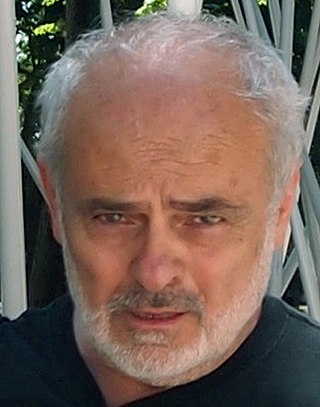
Joshua Neustein is a contemporary visual artist who lives and works in New York City. He is known for his Conceptual Art, environmental installations, Land Art, Postminimalist torn paper works, epistemic abstraction, deconstructed canvas works, and large-scale map paintings.
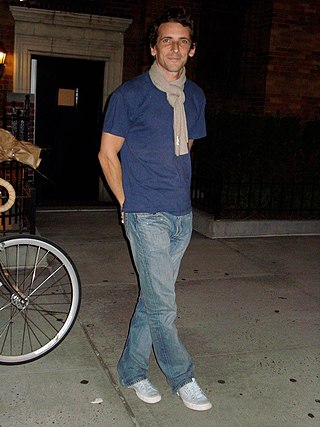
Manfredi Beninati is an Italian artist born in Palermo (Sicily) in 1970. A contemporary figurative painter, his oeuvre also covers installations, drawings, sculpture, collage and film.
Avner Ben-Gal is an international painter and artist, working mainly from Tel Aviv, Israel. His works depict various intense, often neglected locations such as agricultural fields, prisons and smoky interiors, whereby theatrical scenes play out. The scenes present ghostly, rough hewn and often low life figures that are bare and hardened. The parallel between Ben-Gal's raw way of painting and his tough, ambiguous subject matter allows a unique intensity within his paintings.
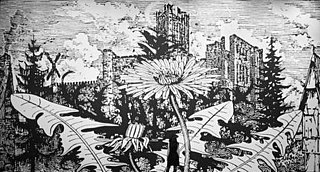
Paul Morrison is a British artist. He was born in Liverpool and received a BA in fine art from Sheffield City Polytechnic. He continued his studies at Goldsmiths College of Art in London, where he received his MA. His first one-person show was in London in 1996 and since then he has exhibited extensively in museums and galleries Worldwide. Morrison lives and works in Yorkshire.
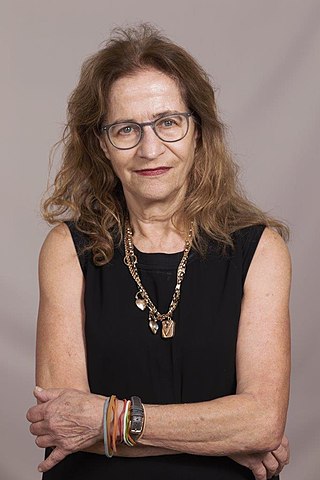
Michal Na'aman, is an Israeli painter. From the point of view of values, her work is characterized as conceptual art and deals with such subjects as the limitations of language and sight, the possibilities for expression, and gender issues. Using the techniques of collage, Na'aman has created works that examine the visual way of thinking as opposed to the verbal way of thinking. In 2014 she was awarded the Israel Prize for Plastic Arts for her work.
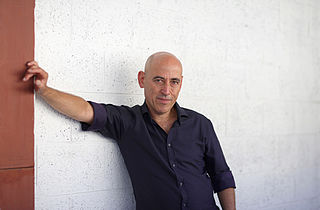
Nahum Tevet is one of the leading Israeli artists whose work was among the earliest to respond to the minimalist canon by introducing into his installations everyday domestic objects, metaphors and images like in: Corner (1973-4) and Arrangements of Six Units.

Joseph Pace is an Italian painter and sculptor.

Miriam Cabessa is an Israeli-American painter, performance and installation artist, winner of the 2022 Israeli Ministry of Culture Lifetime Achievement Award. Cabessa was born in Morocco, raised in Israel, and has lived and worked in New York City since 2000. Her slow action painting has been internationally recognized since 1997 when she represented Israel at the Venice Biennale. Over the past two decades, she has abstained from using brushes, opting to make marks with objects and her body. Her imagery ranges from organic to mechanistic with surfaces that are both haptically handmade and digitally serene. Cabessa has shown extensively in the U.S., Europe, and Israel.

Boncompagni Ludovisi Decorative Arts Museum, Rome, is the Decorative Arts Museum of the National Gallery of Modern Art of Rome. The Museum is located at Via Boncompagni, 18, near the elegant and historical Via Veneto.
Giuseppe Veneziano is an Italian painter and one of the leading figures of Italian art groups "New Pop" and "Italian Newbrow".

David Adika is an Israeli photographer and educator.

The Papafava were an aristocratic family of Padua, a junior branch of the Carraresi. It was admitted into the Venetian patriciate among the so-called Houses Made for Money.

Palma Bucarelli was an Italian art historian, curator and administrator, mostly known for her tenure as director of the Galleria Nazionale d'Arte Moderna (GNAM) in Rome from 1942 to 1975.
Luca Pignatelli is an Italian artist.
Smadar Sheffi is the Chief Curator of the Contemporary Art Center, Ramle – CACR. She is an art critic, researcher of contemporary art and culture, and independent curator. Over past years, she has gained vast experience in curating exhibitions in historical structures, among them the Bialik House Museum, Jerusalem Artists House, Contemporary Art Center, Ramla-CACR, and the Pool of the Arches, Ramla. Dr. Sheffi’s bilingual blog of art criticism and notes on contemporary culture, The Window [1] has been active since 2012.
Nancy Genn is an American artist living and working in Berkeley, California known for works in a variety of media, including paintings, bronze sculpture, printmaking, and handmade paper rooted in the Japanese washi paper making tradition. Her work explores geometric abstraction, non-objective form, and calligraphic mark making, and features light, landscape, water, and architecture motifs. She is influenced by her extensive travels, and Asian craft, aesthetics and spiritual traditions.

Hadar Gad is an Israeli artist.